Complete Guide to 5 Panel Drug Screening: Benefits, Process, and Legal Aspects
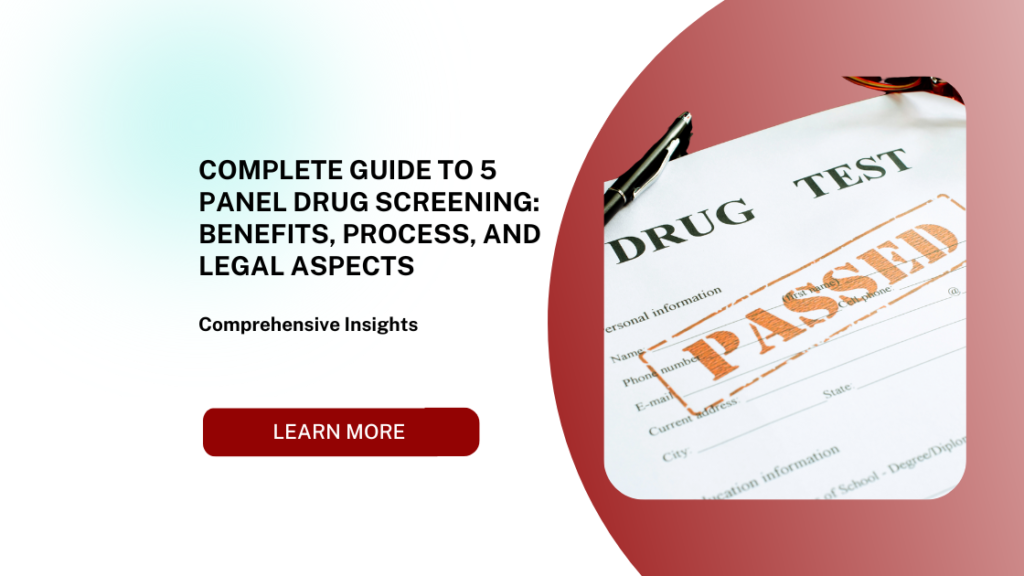
Introduction and Overview of 5 Panel Drug Screening
What is a 5 Panel Drug Screening?
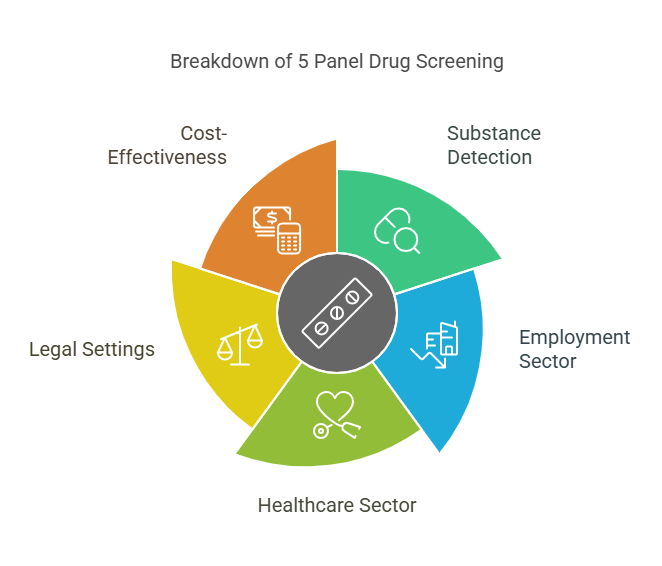
A 5 panel drug screening is a commonly used test designed to detect the presence of specific illicit substances in an individual’s system. This type of drug test is popular in various sectors, including employment, healthcare, and legal settings, as it provides a quick and reliable way to assess whether an individual has recently used drugs that are often associated with impairing behavior or health risks.
The “5 panel” refers to the five substances that the test specifically screens for. These substances are typically those that are most commonly abused and pose the highest risks to workplace safety, public health, and individual well-being.
While there are other types of drug screenings that test for a wider array of substances, the 5 panel test is often chosen for its balance between thoroughness and cost-effectiveness. It provides sufficient coverage for many employers and organizations while focusing on the most critical drugs associated with workplace impairment or health issues.
Common Substances Included in a 5 Panel Drug Screening
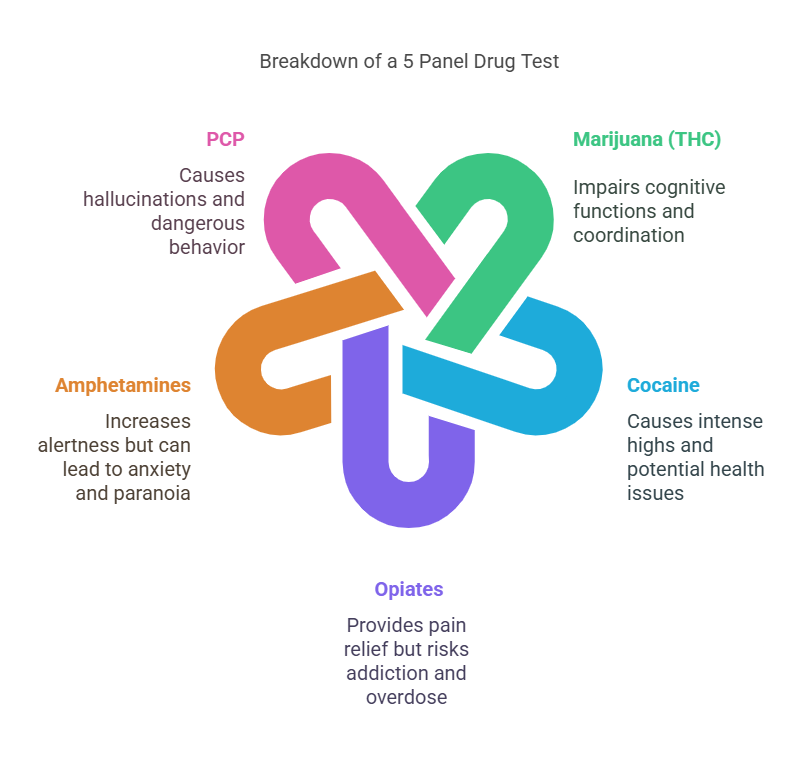
A 5 panel drug test typically screens for the following five substances:
- Marijuana (THC)
- Effect on Health/Behavior: THC, the active component in marijuana, is known for its psychoactive properties that can impair cognitive functions, such as attention, memory, and coordination. Its use can affect an individual’s ability to perform tasks that require concentration or fine motor skills, such as driving or operating machinery.
- Cocaine
- Effect on Health/Behavior: Cocaine is a powerful stimulant that affects the central nervous system. It can cause a quick and intense high followed by a sharp comedown. Chronic use can lead to health problems such as heart issues, neurological damage, and severe addiction. Cocaine use can also lead to impulsive or erratic behavior, making it a significant safety concern in workplaces that require focus and stability.
- Opiates (Opioids)
- Effect on Health/Behavior: This group includes substances like heroin, morphine, codeine, and prescription painkillers like oxycodone. Opiates can cause drowsiness, pain relief, and euphoria, but they also carry a high risk of addiction and overdose. Long-term use can lead to severe physical dependence, and opiate use can impair cognitive function and motor skills.
- Amphetamines
- Effect on Health/Behavior: Amphetamines are stimulants commonly used to treat conditions like ADHD but are also abused recreationally. They can lead to heightened alertness, increased energy, and improved mood, but overuse or abuse can cause anxiety, paranoia, and physical issues such as increased heart rate and high blood pressure. Amphetamine abuse can also impair judgment and decision-making.
- PCP (Phencyclidine)
- Effect on Health/Behavior: PCP, also known as “angel dust,” is a hallucinogenic drug that affects the central nervous system. It can cause severe psychological effects, including agitation, aggression, paranoia, and delusions. PCP also impairs motor functions and can lead to dangerous behavior, making it a significant risk factor in workplaces that require physical coordination and focus.
Substances Tested in a 5 Panel Drug Screening:
| Substance | Effect on Health/Behavior |
|---|---|
| Marijuana (THC) | Impaired cognitive function, memory, coordination; euphoria |
| Cocaine | Euphoria, increased energy, paranoia, impulsive behavior, addiction |
| Opiates | Drowsiness, euphoria, pain relief, addiction, motor impairment |
| Amphetamines | Increased alertness, euphoria, anxiety, paranoia, judgment issues |
| PCP | Hallucinations, aggression, paranoia, impaired motor skills |
The Procedure for Conducting a 5 Panel Drug Screening
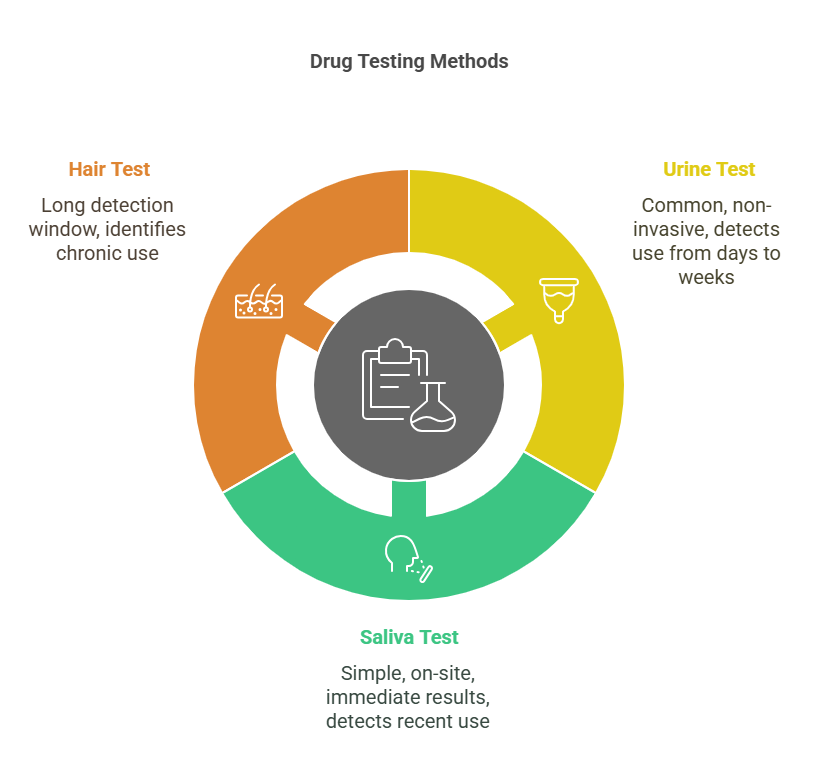
The process for conducting a 5 panel drug screening varies based on the type of test used and the setting in which it is conducted. There are three primary types of drug tests used for this screening:
- Urine Drug Test:
- The most common method for drug screening. It’s non-invasive and can detect drug use within a few days to weeks, depending on the drug. Urine tests are easy to administer, cost-effective, and provide a reliable means of testing for the substances included in the 5 panel screening.
- Saliva Drug Test:
- Saliva tests are increasingly used because they are simple and can be administered on-site, providing immediate results. These tests detect recent drug use, typically within a 24-hour window, and can be useful for pre-employment screening or random workplace testing.
- Hair Drug Test:
- Hair follicle tests have a longer detection window, capable of identifying drug use up to 90 days prior. While this method is less commonly used in standard 5 panel drug screenings, it is highly effective for detecting chronic drug use and can be a valuable tool for situations where a longer history of substance use needs to be assessed.
The General Procedure for Conducting a 5 Panel Drug Screening
- Pre-Test Authorization: The individual being tested must provide consent before the test is conducted. Consent forms should outline what substances will be tested for and what the procedure involves.
- Collection: Depending on the type of test, a urine sample, saliva swab, or hair sample will be collected. For urine tests, individuals may need to provide the sample in a private setting to ensure the sample is legitimate and uncontaminated.
- Laboratory Analysis: The sample is sent to a certified laboratory for analysis. The laboratory will test for the presence of the five substances specified in the 5 panel drug screen.
- Results Reporting: After testing, results are sent back to the employer, healthcare provider, or relevant party. Negative results are usually straightforward, while positive results may require additional verification, such as a confirmation test.
- Post-Test Action: Based on the results, the relevant party (e.g., an employer or healthcare provider) will decide on the next steps, which may include providing the individual with counseling, offering resources for rehabilitation, or taking disciplinary action if the test was part of a workplace policy.
Benefits, Applications, and Our Services
Benefits of 5 Panel Drug Screening
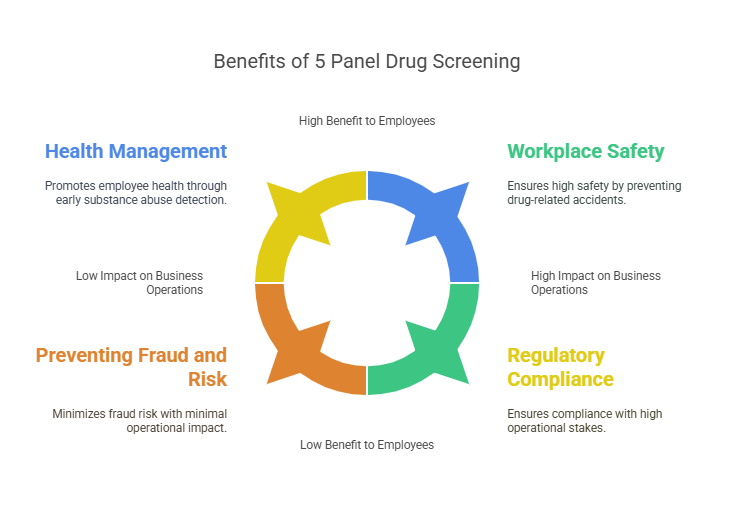
Implementing a 5 panel drug screening offers numerous benefits for both employers and individuals, particularly when it comes to safety, health management, and compliance with legal standards. Below are some of the key advantages of using this type of drug screening:
1. Workplace Safety
One of the most significant benefits of conducting a 5 panel drug screening is ensuring workplace safety. Substance abuse, especially the use of drugs like cocaine, opiates, and marijuana, can impair an individual’s ability to perform tasks safely and efficiently. For industries that involve operating heavy machinery, driving, or handling sensitive materials, drug use can result in accidents, injuries, or even fatalities. By identifying and preventing employees who may be under the influence of drugs from entering or remaining in the workforce, businesses can reduce the risk of workplace accidents and increase overall productivity.
2. Regulatory Compliance
Many industries, such as transportation, healthcare, and manufacturing, are required to comply with strict drug testing regulations. For example, the Department of Transportation (DOT) mandates drug testing for drivers to ensure road safety. By conducting 5 panel drug screenings, employers can stay compliant with these regulations and avoid legal repercussions, including fines and penalties, while promoting a safe environment for both employees and the public.
3. Health Management
For healthcare providers and organizations involved in managing employee wellness, drug screenings play an important role in ensuring that employees are not using substances that could impact their health or performance. Early detection of substance abuse can help employees seek treatment before their condition worsens, leading to a healthier, more productive workforce.
4. Preventing Fraud and Risk
A 5 panel drug test can help identify applicants or employees who may be engaging in substance abuse, reducing the risk of fraudulent behavior. Drug abuse can contribute to poor decision-making, dishonesty, and financial mismanagement, all of which can have a negative impact on a company’s bottom line. By implementing drug screenings, businesses can mitigate these risks and protect their assets.
5. Reducing Liability and Insurance Costs
Drug use is linked to an increase in workplace injuries, legal claims, and insurance costs. Conducting pre-employment or random drug testing ensures that workers who may be under the influence of drugs are identified early, reducing the likelihood of workplace injuries. This, in turn, can lower workers’ compensation premiums and liability insurance costs, providing long-term financial savings for businesses.
Applications of 5 Panel Drug Screening
The 5 panel drug test is widely used in various industries and scenarios. Here are a few common applications:
1. Pre-Employment Screening
Before hiring new employees, many businesses require drug testing as part of the recruitment process. A pre-employment 5 panel drug screening ensures that an applicant is not using illicit drugs, which could impair their performance or pose a risk to the workplace. This is especially important in industries with safety-sensitive positions, such as transportation, construction, and healthcare.
2. Random Drug Testing
Once an employee is hired, some employers conduct random drug testing to ensure continued compliance with workplace drug policies. Random drug testing acts as a deterrent, encouraging employees to stay drug-free. It also allows employers to detect substance abuse early, addressing potential issues before they escalate.
3. Post-Accident Drug Testing
When workplace accidents or injuries occur, employers often require a post-accident drug test to determine if drug use was a contributing factor. A post-accident 5 panel drug screening can help employers identify the cause of the incident and protect the company from liability if an employee was under the influence while working.
4. Return-to-Duty Testing
If an employee has been on leave due to a drug-related issue or an incident related to substance abuse, a return-to-duty drug test is often required. This test ensures that the individual is no longer under the influence of drugs and is fit to return to work. It is a crucial part of workplace substance abuse management and employee rehabilitation.
5. Legal and Court-Ordered Drug Testing
In some legal situations, such as custody disputes or probation conditions, individuals may be required to undergo court-ordered drug testing. A 5 panel drug screening can be used to satisfy these legal requirements, ensuring compliance with the court’s decision.
Our Services: ExactBackgroundChecks
At ExactBackgroundChecks, we specialize in providing fast, accurate, and comprehensive drug testing services, including 5 panel drug screenings, for employers and individuals across a variety of industries. Our services are designed to help organizations comply with workplace regulations, ensure the safety of their workforce, and maintain a drug-free environment.
How We Assist Businesses
We understand the importance of employee safety and regulatory compliance, which is why we offer customized drug testing solutions for businesses. Whether you’re conducting pre-employment screening, random testing, or post-accident testing, our 5 panel drug screening services are fully compliant with industry standards and regulations.
Easy Process and Fast Results
Our easy-to-follow process ensures that drug testing is streamlined and efficient. We provide convenient testing options, including urine, saliva, and hair follicle tests, and offer fast turnaround times, with results typically available within 24-48 hours. We make the drug screening process as easy as possible, ensuring that employers can quickly make informed decisions.
Confidential and Secure
At ExactBackgroundChecks.com, we prioritize confidentiality and security. All drug testing results are kept secure and are shared only with authorized individuals. We adhere to all privacy laws, ensuring that your employees’ rights are protected at every step of the process.
Compliance and Peace of Mind
With our services, you can be confident that your company is in compliance with relevant laws and regulations. Whether you’re subject to federal mandates or industry-specific standards, we help you navigate the complex world of drug testing, ensuring that you are following best practices and maintaining a safe, compliant workplace.
Legal Aspects of 5 Panel Drug Screening
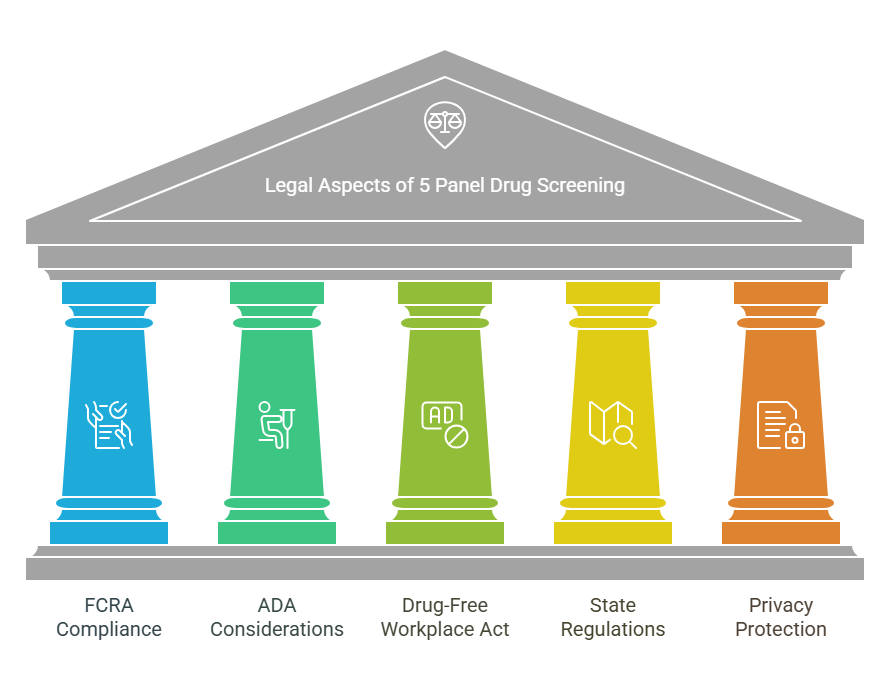
Conducting a 5 panel drug screening involves understanding and adhering to a variety of federal, state, and local laws. These regulations govern how drug tests are administered, who can be tested, and how the results should be handled. Below are some key legal considerations to keep in mind when conducting drug screenings:
1. Fair Credit Reporting Act (FCRA)
The Fair Credit Reporting Act (FCRA) is a federal law that regulates the collection and use of consumer information, including drug test results. When conducting background checks or drug screenings for employment purposes, employers must follow FCRA guidelines. This includes obtaining written consent from the employee or applicant before performing the drug test and informing them of the testing process. Employers must also provide a notice if they intend to take adverse action based on the drug test results, such as not hiring or terminating an employee.
2. Americans with Disabilities Act (ADA)
The Americans with Disabilities Act (ADA) prohibits discrimination based on disabilities in employment. However, the ADA allows employers to require drug tests for illicit drugs. The law does not prevent employers from screening for illegal substances, but it does restrict employers from discriminating against employees who are recovering from addiction, as long as they are not currently using drugs. Employers must make reasonable accommodations for employees who are in recovery, as long as they can perform the essential functions of the job.
3. Drug-Free Workplace Act
The Drug-Free Workplace Act mandates that federal contractors and certain grantees maintain a drug-free workplace. Employers subject to this act must implement drug testing programs to ensure that employees are not using drugs while on the job. A 5 panel drug screening is a standard tool used to meet the requirements of this act. Employers must inform their employees of the drug-free policy and conduct regular drug testing to ensure compliance.
4. State-Specific Regulations
In addition to federal laws, state laws also govern drug testing procedures. Some states have specific rules regarding when drug testing can be conducted, how the results can be used, and what substances must be included in the testing panel. For example, some states prohibit drug testing for marijuana, while others allow it only for certain types of employment. It’s essential for employers to be aware of state-specific regulations to ensure compliance with local laws.
5. Privacy and Confidentiality
Employers must ensure the privacy and confidentiality of drug test results. Under the Health Insurance Portability and Accountability Act (HIPAA) and other privacy laws, drug test results are considered sensitive personal health information. Employers must keep test results confidential and only disclose them to authorized individuals. Unauthorized sharing of test results can result in legal consequences.
Frequently Asked Questions (FAQs) About 5 Panel Drug Screenings
What is a 5 panel drug screening?
It's a test that detects the presence of five common illicit substances: marijuana (THC), cocaine, opiates, amphetamines, and PCP.
What are the common substances included in a 5 panel drug screening?
The five substances are marijuana (THC), cocaine, opiates, amphetamines, and PCP.
What are the procedures for conducting a 5 panel drug screening?
Procedures involve pre-test authorization, sample collection (urine, saliva, or hair), laboratory analysis, results reporting, and post-test action.
What are the benefits of 5 panel drug screening?
Benefits include ensuring workplace safety, regulatory compliance, health management, preventing fraud and risk, and reducing liability and insurance costs.
What legal aspects should be considered when conducting 5 panel drug screening?
Legal aspects include compliance with the Fair Credit Reporting Act (FCRA), the Americans with Disabilities Act (ADA), the Drug-Free Workplace Act, state-specific regulations, and ensuring privacy and confidentiality.
What is a 5 panel drug screening?
It's a test that detects the presence of five common illicit substances: marijuana (THC), cocaine, opiates, amphetamines, and PCP.
What are the common substances included in a 5 panel drug screening?
The five substances are marijuana (THC), cocaine, opiates, amphetamines, and PCP.
What are the procedures for conducting a 5 panel drug screening?
Procedures involve pre-test authorization, sample collection (urine, saliva, or hair), laboratory analysis, results reporting, and post-test action.
What are the benefits of 5 panel drug screening?
Benefits include ensuring workplace safety, regulatory compliance, health management, preventing fraud and risk, and reducing liability and insurance costs.
What legal aspects should be considered when conducting 5 panel drug screening?
Legal aspects include compliance with the Fair Credit Reporting Act (FCRA), the Americans with Disabilities Act (ADA), the Drug-Free Workplace Act, state-specific regulations, and ensuring privacy and confidentiality.
Conclusion: Why 5 Panel Drug Screening is Essential
5 panel drug screening plays a crucial role in ensuring workplace safety, maintaining regulatory compliance, and promoting employee well-being. By identifying substance abuse early on, employers can prevent potential risks, such as accidents, health issues, and decreased productivity. It also helps businesses comply with legal requirements and protect their assets from financial and reputational damage.
Whether you’re an employer looking to implement drug testing in your workplace, or an individual seeking to understand the screening process, it’s essential to ensure that testing is done legally and ethically. Adhering to the proper protocols and legal guidelines when conducting 5 panel drug screenings is vital for maintaining a safe, productive, and compliant environment.



